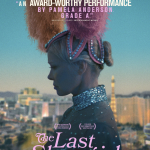A singular profile of British pop superstar Robbie Williams.
Chuck says:
In researching British pop star Robbie Williams for a potential biopic, director Michael Gracey noticed that in numerous interviews, the singer referred to himself as a monkey being dragged onto the stage, forced to perform. The seed of the idea of portraying the performer as a simian took root there and gained traction once the filmmaker and his two co-writers, Simon Gleeson and Oliver Cole, realized how this approach would serve as an effective metaphor for Williams’ numerous addictions. And as the singer points out, “We have deep empathy and compassion for animals, way more than we do for humans.”
This certainly helps because throughout a good chunk of Gracey’s “Better Man,” Williams’ behavior is insufferable. That he’s seen as a doleful monkey certainly helps the viewer stay in his corner. Much like so many other biopics of tortured artists, Williams’ story hits all the familiar notes – a dysfunctional upbringing, sudden stardom, self-destructive behavior, miraculous career resurrection – that the sameness of it all dulls its emotional impact. That being said, that monkey is a charmer and the special effects work on display is astonishing, the film often working more as a technical marvel than a compelling biography.
Due to his father’s (Steve Pemberton) desire to become a pop star, Williams (Jonno Davies) became enamored with the likes of Frank Sinatra, Sammy Davis Jr. and Dean Martin at an early age. Singing along with these performers on the T.V., the young boy takes his dad’s words regarding his prospects – “You’re either born with it or you’re a nobody” – to heart. And when his father abandons the family to pursue his dream, Williams’ goal is bolstered by his ever-supportive grandmother and mother (Alison Steadman and Kate Mulvany).
Williams’ fortunes take a turn when he’s made a member of the boy band “Take That,” the group becoming an overnight sensation, the singer diving headfirst into all the excess his newfound stardom affords him. Drugs are abused, the singer is thrown out of the group, he alienates his girlfriend pop singer Nicole Appleton (Rachelle Banno), hits rock bottom and…well, you know the rest.
Despite the familiarity of the story, Gracey’s innovations in the staging of various musical numbers and the way he employs his CGI-wrought leading man, are impressive. There are showstopping moments aplenty, chief among them an extended song-and-dance number that takes place along Regent Street to “Rock DJ.” Equally impressive is a boundary breaking scene driven by William’s “Come Undone,” that finds the singer fleeing from his troubles, hurtling towards oblivion. While these set-pieces are visual stunners, they also forcefully drive the story along.
The work by Luke Millar and Andy Taylor of Weta captivates throughout, so much so that this gimmick never wears out its welcome. Davies studied hours upon hours of archival footage featuring Williams to capture his swagger and facial expressions. Just how much of his work survives the transition that occurs to create the simian avatar is unknown, though the final product does resemble the singer’s physicality to a remarkable degree.
Gracey is well-aware he’s walking in the footsteps of “Bohemian Rhapsody,” “Rocketman” and many others. Yet, he doesn’t let that deter him from creating a distinctive, energetic piece of work that succeeds despite many potential pitfalls. Williams’ evolution from stunted man-child to a more reliable member of society culminates with a celebration of his career, a concert that sees him reconciling with his father on stage. That “My Way” is the concluding number is fitting. Despite the naysayers, Williams and Gracey have cut their own path with “Better Man,” a radical if flawed examination of one monkey’s evolution to maturity.
3 Stars




